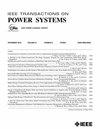瞬态稳定性评估的误分类预测
IF 6.5
1区 工程技术
Q1 ENGINEERING, ELECTRICAL & ELECTRONIC
引用次数: 0
摘要
电力系统运营商的决策取决于近乎实时生成的电力系统稳定性指标。在这种情况下,不稳定性的识别必须快速准确,以便及时做出反应。经过预训练的深度学习网络可以提供这种超快速和准确的识别。然而,即使在海量数据的基础上进行了训练,通常也会错误地对少数边缘案例进行分类。如果将误判概率作为附加指标,这个问题就能迎刃而解。在这项关于执行瞬态稳定性评估的研究中,我们建议采用分类深度学习方法进行每样本误分类预测,该方法得到了源自真实类概率属性的理论保证的支持。我们还表明,稳定性预测的失败在很大程度上取决于用于定义分类输入数据长度的数据窗口。该方法在 39 总线 IEEE 和 179 总线 WECC 模型上得到了验证。本文章由计算机程序翻译,如有差异,请以英文原文为准。
Misclassification Prediction for Transient Stability Assessment
Decisions of power system operators are dependent on indicators of power system stability that are generated near real-time. In this context identification of instability has to be fast and accurate in order to allow for timely response. Pretrained deep learning networks can provide such ultra-fast and accurate identification. However, even though the training is performed on a vast amount of data, a small number of borderline cases are usually classified erroneously. This issue can be resolved if the probability of misclassification is used as an additional metric. In this research on performing transient stability assessment, we propose to employ the classification deep learning methodology of per-sample misclassification prediction that is supported with theoretical guarantees originated from true class probability properties. We also show that the failure of stability prediction highly depends on the data window that is used to define the input data length for classification. The methodology is validated on the 39-bus IEEE and 179-bus WECC models.
求助全文
通过发布文献求助,成功后即可免费获取论文全文。
去求助
来源期刊

IEEE Transactions on Power Systems
工程技术-工程:电子与电气
CiteScore
15.80
自引率
7.60%
发文量
696
审稿时长
3 months
期刊介绍:
The scope of IEEE Transactions on Power Systems covers the education, analysis, operation, planning, and economics of electric generation, transmission, and distribution systems for general industrial, commercial, public, and domestic consumption, including the interaction with multi-energy carriers. The focus of this transactions is the power system from a systems viewpoint instead of components of the system. It has five (5) key areas within its scope with several technical topics within each area. These areas are: (1) Power Engineering Education, (2) Power System Analysis, Computing, and Economics, (3) Power System Dynamic Performance, (4) Power System Operations, and (5) Power System Planning and Implementation.
 求助内容:
求助内容: 应助结果提醒方式:
应助结果提醒方式:


